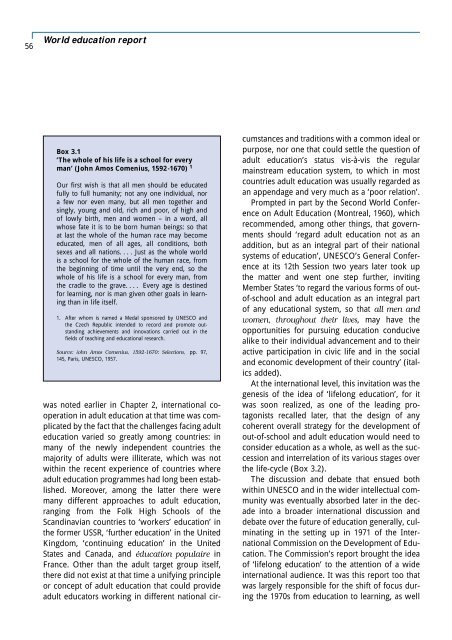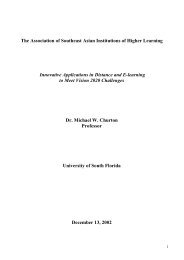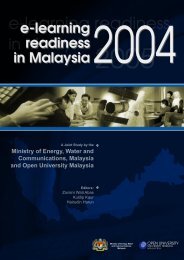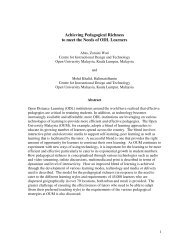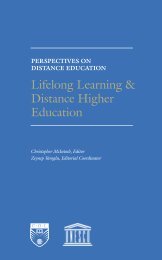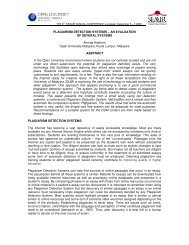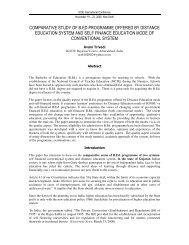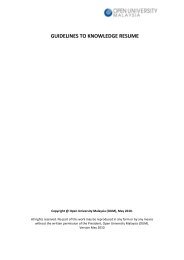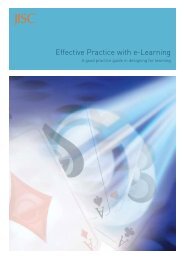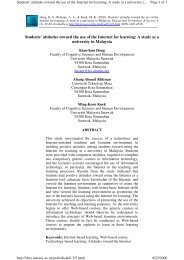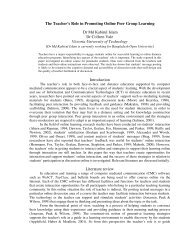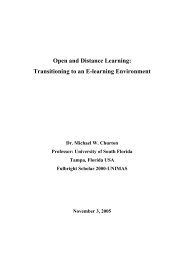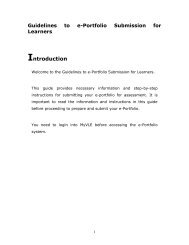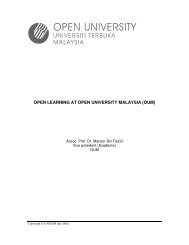The right to education - Asia Pacific Knowledge Base on Open and ...
The right to education - Asia Pacific Knowledge Base on Open and ...
The right to education - Asia Pacific Knowledge Base on Open and ...
Create successful ePaper yourself
Turn your PDF publications into a flip-book with our unique Google optimized e-Paper software.
56World <str<strong>on</strong>g>educati<strong>on</strong></str<strong>on</strong>g> reportBox 3.1‘<str<strong>on</strong>g>The</str<strong>on</strong>g> whole of his life is a school for everyman’ (John Amos Comenius, 1592–1670) 1Our first wish is that all men should be educatedfully <str<strong>on</strong>g>to</str<strong>on</strong>g> full humanity; not any <strong>on</strong>e individual, nora few nor even many, but all men <str<strong>on</strong>g>to</str<strong>on</strong>g>gether <strong>and</strong>singly, young <strong>and</strong> old, rich <strong>and</strong> poor, of high <strong>and</strong>of lowly birth, men <strong>and</strong> women – in a word, allwhose fate it is <str<strong>on</strong>g>to</str<strong>on</strong>g> be born human beings: so thatat last the whole of the human race may becomeeducated, men of all ages, all c<strong>on</strong>diti<strong>on</strong>s, bothsexes <strong>and</strong> all nati<strong>on</strong>s. . . . Just as the whole worldis a school for the whole of the human race, fromthe beginning of time until the very end, so thewhole of his life is a school for every man, fromthe cradle <str<strong>on</strong>g>to</str<strong>on</strong>g> the grave. . . . Every age is destinedfor learning, nor is man given other goals in learningthan in life itself.1. After whom is named a Medal sp<strong>on</strong>sored by UNESCO <strong>and</strong>the Czech Republic intended <str<strong>on</strong>g>to</str<strong>on</strong>g> record <strong>and</strong> promote outst<strong>and</strong>ingachievements <strong>and</strong> innovati<strong>on</strong>s carried out in thefields of teaching <strong>and</strong> <str<strong>on</strong>g>educati<strong>on</strong></str<strong>on</strong>g>al research.Source: John Amos Comenius, 1592–1670: Selecti<strong>on</strong>s, pp. 97,145, Paris, UNESCO, 1957.was noted earlier in Chapter 2, internati<strong>on</strong>al cooperati<strong>on</strong>in adult <str<strong>on</strong>g>educati<strong>on</strong></str<strong>on</strong>g> at that time was complicatedby the fact that the challenges facing adult<str<strong>on</strong>g>educati<strong>on</strong></str<strong>on</strong>g> varied so greatly am<strong>on</strong>g countries: inmany of the newly independent countries themajority of adults were illiterate, which was notwithin the recent experience of countries whereadult <str<strong>on</strong>g>educati<strong>on</strong></str<strong>on</strong>g> programmes had l<strong>on</strong>g been established.Moreover, am<strong>on</strong>g the latter there weremany different approaches <str<strong>on</strong>g>to</str<strong>on</strong>g> adult <str<strong>on</strong>g>educati<strong>on</strong></str<strong>on</strong>g>,ranging from the Folk High Schools of theSc<strong>and</strong>inavian countries <str<strong>on</strong>g>to</str<strong>on</strong>g> ‘workers’ <str<strong>on</strong>g>educati<strong>on</strong></str<strong>on</strong>g>’ inthe former USSR, ‘further <str<strong>on</strong>g>educati<strong>on</strong></str<strong>on</strong>g>’ in the UnitedKingdom, ‘c<strong>on</strong>tinuing <str<strong>on</strong>g>educati<strong>on</strong></str<strong>on</strong>g>’ in the UnitedStates <strong>and</strong> Canada, <strong>and</strong> éducati<strong>on</strong> populaire inFrance. Other than the adult target group itself,there did not exist at that time a unifying principleor c<strong>on</strong>cept of adult <str<strong>on</strong>g>educati<strong>on</strong></str<strong>on</strong>g> that could provideadult educa<str<strong>on</strong>g>to</str<strong>on</strong>g>rs working in different nati<strong>on</strong>al circumstances<strong>and</strong> traditi<strong>on</strong>s with a comm<strong>on</strong> ideal orpurpose, nor <strong>on</strong>e that could settle the questi<strong>on</strong> ofadult <str<strong>on</strong>g>educati<strong>on</strong></str<strong>on</strong>g>’s status vis-à-vis the regularmainstream <str<strong>on</strong>g>educati<strong>on</strong></str<strong>on</strong>g> system, <str<strong>on</strong>g>to</str<strong>on</strong>g> which in mostcountries adult <str<strong>on</strong>g>educati<strong>on</strong></str<strong>on</strong>g> was usually regarded asan appendage <strong>and</strong> very much as a ‘poor relati<strong>on</strong>’.Prompted in part by the Sec<strong>on</strong>d World C<strong>on</strong>ference<strong>on</strong> Adult Educati<strong>on</strong> (M<strong>on</strong>treal, 1960), whichrecommended, am<strong>on</strong>g other things, that governmentsshould ‘regard adult <str<strong>on</strong>g>educati<strong>on</strong></str<strong>on</strong>g> not as anadditi<strong>on</strong>, but as an integral part of their nati<strong>on</strong>alsystems of <str<strong>on</strong>g>educati<strong>on</strong></str<strong>on</strong>g>’, UNESCO’s General C<strong>on</strong>ferenceat its 12th Sessi<strong>on</strong> two years later <str<strong>on</strong>g>to</str<strong>on</strong>g>ok upthe matter <strong>and</strong> went <strong>on</strong>e step further, invitingMember States ‘<str<strong>on</strong>g>to</str<strong>on</strong>g> regard the various forms of ou<str<strong>on</strong>g>to</str<strong>on</strong>g>f-school<strong>and</strong> adult <str<strong>on</strong>g>educati<strong>on</strong></str<strong>on</strong>g> as an integral par<str<strong>on</strong>g>to</str<strong>on</strong>g>f any <str<strong>on</strong>g>educati<strong>on</strong></str<strong>on</strong>g>al system, so that all men <strong>and</strong>women, throughout their lives, may have theopportunities for pursuing <str<strong>on</strong>g>educati<strong>on</strong></str<strong>on</strong>g> c<strong>on</strong>ducivealike <str<strong>on</strong>g>to</str<strong>on</strong>g> their individual advancement <strong>and</strong> <str<strong>on</strong>g>to</str<strong>on</strong>g> theiractive participati<strong>on</strong> in civic life <strong>and</strong> in the social<strong>and</strong> ec<strong>on</strong>omic development of their country’ (italicsadded).At the internati<strong>on</strong>al level, this invitati<strong>on</strong> was thegenesis of the idea of ‘lifel<strong>on</strong>g <str<strong>on</strong>g>educati<strong>on</strong></str<strong>on</strong>g>’, for itwas so<strong>on</strong> realized, as <strong>on</strong>e of the leading protag<strong>on</strong>istsrecalled later, that the design of anycoherent overall strategy for the development ofout-of-school <strong>and</strong> adult <str<strong>on</strong>g>educati<strong>on</strong></str<strong>on</strong>g> would need <str<strong>on</strong>g>to</str<strong>on</strong>g>c<strong>on</strong>sider <str<strong>on</strong>g>educati<strong>on</strong></str<strong>on</strong>g> as a whole, as well as the successi<strong>on</strong><strong>and</strong> interrelati<strong>on</strong> of its various stages overthe life-cycle (Box 3.2).<str<strong>on</strong>g>The</str<strong>on</strong>g> discussi<strong>on</strong> <strong>and</strong> debate that ensued bothwithin UNESCO <strong>and</strong> in the wider intellectual communitywas eventually absorbed later in the decadein<str<strong>on</strong>g>to</str<strong>on</strong>g> a broader internati<strong>on</strong>al discussi<strong>on</strong> <strong>and</strong>debate over the future of <str<strong>on</strong>g>educati<strong>on</strong></str<strong>on</strong>g> generally, culminatingin the setting up in 1971 of the Internati<strong>on</strong>alCommissi<strong>on</strong> <strong>on</strong> the Development of Educati<strong>on</strong>.<str<strong>on</strong>g>The</str<strong>on</strong>g> Commissi<strong>on</strong>’s report brought the ideaof ‘lifel<strong>on</strong>g <str<strong>on</strong>g>educati<strong>on</strong></str<strong>on</strong>g>’ <str<strong>on</strong>g>to</str<strong>on</strong>g> the attenti<strong>on</strong> of a wideinternati<strong>on</strong>al audience. It was this report <str<strong>on</strong>g>to</str<strong>on</strong>g>o thatwas largely resp<strong>on</strong>sible for the shift of focus duringthe 1970s from <str<strong>on</strong>g>educati<strong>on</strong></str<strong>on</strong>g> <str<strong>on</strong>g>to</str<strong>on</strong>g> learning, as well


